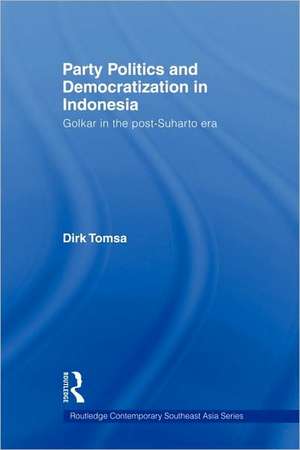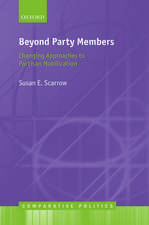Party Politics and Democratization in Indonesia: Golkar in the post-Suharto era: Routledge Contemporary Southeast Asia Series
Autor Dirk Tomsaen Limba Engleză Paperback – 4 ian 2010
Applying a multi-dimensional conceptual framework of party institutionalization theory, the book examines Golkar’s organizational infrastructure, its decisional autonomy and programmatic platform as well as the party’s relations to the mass media. Strengths and weaknesses in the individual dimensions of institutionalization are then contrasted with the corresponding levels of institutionalization reached by Indonesia’s other major parties. Tomsa argues that Golkar remains Indonesia’s strongest party because it is better institutionalized than its electoral competitors. However, while highlighting the former regime party’s strengths in key aspects of party institutionalization, he also shows that Golkar also has some considerable institutional weaknesses which in 2004 prevented the party from achieving an even better result in the general election
As an empirical study on Golkar, and Indonesia's other major political parties, this book will be of huge interest to students and scholars of Southeast Asian politics, political parties and elections and democratization.
| Toate formatele și edițiile | Preț | Express |
|---|---|---|
| Paperback (1) | 413.94 lei 6-8 săpt. | |
| Taylor & Francis – 4 ian 2010 | 413.94 lei 6-8 săpt. | |
| Hardback (1) | 1280.80 lei 6-8 săpt. | |
| Taylor & Francis – 17 iul 2008 | 1280.80 lei 6-8 săpt. |
Din seria Routledge Contemporary Southeast Asia Series
-
 Preț: 310.84 lei
Preț: 310.84 lei -
 Preț: 310.65 lei
Preț: 310.65 lei -
 Preț: 281.72 lei
Preț: 281.72 lei -
 Preț: 310.95 lei
Preț: 310.95 lei -
 Preț: 317.63 lei
Preț: 317.63 lei -
 Preț: 310.96 lei
Preț: 310.96 lei -
 Preț: 320.51 lei
Preț: 320.51 lei -
 Preț: 151.94 lei
Preț: 151.94 lei -
 Preț: 340.62 lei
Preț: 340.62 lei -
 Preț: 318.65 lei
Preț: 318.65 lei - 18%
 Preț: 1058.79 lei
Preț: 1058.79 lei - 18%
 Preț: 1055.21 lei
Preț: 1055.21 lei -
 Preț: 412.57 lei
Preț: 412.57 lei - 41%
 Preț: 238.48 lei
Preț: 238.48 lei - 18%
 Preț: 1054.58 lei
Preț: 1054.58 lei - 18%
 Preț: 1111.51 lei
Preț: 1111.51 lei - 18%
 Preț: 1062.98 lei
Preț: 1062.98 lei - 18%
 Preț: 1166.49 lei
Preț: 1166.49 lei - 18%
 Preț: 1056.28 lei
Preț: 1056.28 lei -
 Preț: 410.28 lei
Preț: 410.28 lei - 18%
 Preț: 1060.25 lei
Preț: 1060.25 lei - 18%
 Preț: 1060.52 lei
Preț: 1060.52 lei - 18%
 Preț: 1057.75 lei
Preț: 1057.75 lei - 18%
 Preț: 708.67 lei
Preț: 708.67 lei - 26%
 Preț: 821.10 lei
Preț: 821.10 lei - 18%
 Preț: 1060.87 lei
Preț: 1060.87 lei - 18%
 Preț: 1057.05 lei
Preț: 1057.05 lei - 25%
 Preț: 825.43 lei
Preț: 825.43 lei - 15%
 Preț: 707.79 lei
Preț: 707.79 lei - 18%
 Preț: 1058.86 lei
Preț: 1058.86 lei - 18%
 Preț: 1280.80 lei
Preț: 1280.80 lei - 25%
 Preț: 824.17 lei
Preț: 824.17 lei - 18%
 Preț: 1000.61 lei
Preț: 1000.61 lei - 28%
 Preț: 820.56 lei
Preț: 820.56 lei - 18%
 Preț: 1064.01 lei
Preț: 1064.01 lei - 18%
 Preț: 736.24 lei
Preț: 736.24 lei - 18%
 Preț: 1164.92 lei
Preț: 1164.92 lei - 18%
 Preț: 1217.95 lei
Preț: 1217.95 lei - 26%
 Preț: 848.03 lei
Preț: 848.03 lei - 18%
 Preț: 1053.47 lei
Preț: 1053.47 lei - 18%
 Preț: 1057.75 lei
Preț: 1057.75 lei - 18%
 Preț: 1053.92 lei
Preț: 1053.92 lei - 18%
 Preț: 1106.02 lei
Preț: 1106.02 lei - 18%
 Preț: 1057.05 lei
Preț: 1057.05 lei - 18%
 Preț: 1060.52 lei
Preț: 1060.52 lei -
 Preț: 428.63 lei
Preț: 428.63 lei -
 Preț: 385.25 lei
Preț: 385.25 lei - 18%
 Preț: 1057.75 lei
Preț: 1057.75 lei
Preț: 413.94 lei
Nou
Puncte Express: 621
Preț estimativ în valută:
79.21€ • 83.29$ • 65.45£
79.21€ • 83.29$ • 65.45£
Carte tipărită la comandă
Livrare economică 17 aprilie-01 mai
Preluare comenzi: 021 569.72.76
Specificații
ISBN-13: 9780415574297
ISBN-10: 0415574293
Pagini: 284
Dimensiuni: 156 x 234 x 15 mm
Greutate: 0.4 kg
Ediția:1
Editura: Taylor & Francis
Colecția Routledge
Seria Routledge Contemporary Southeast Asia Series
Locul publicării:Oxford, United Kingdom
ISBN-10: 0415574293
Pagini: 284
Dimensiuni: 156 x 234 x 15 mm
Greutate: 0.4 kg
Ediția:1
Editura: Taylor & Francis
Colecția Routledge
Seria Routledge Contemporary Southeast Asia Series
Locul publicării:Oxford, United Kingdom
Public țintă
Postgraduate and UndergraduateCuprins
1. Introduction: The Remarkable Resilience of Golkar 2. Theoretical Reflections: Protracted Transitions, Uneven Party Institutionalization and the Special Role of Former Hegemonic Parties 3. Systemness: Deconstructing the Myth of Golkar’s Party Machinery 4. Decisional Autonomy: The Main Problems Lurk Inside the Party 5. Value Infusion: In Search of Golkar’s Roots 6. Party Reification: Mastering the Use of Symbols and the Pitfalls of Political Communication 7. Gauging Uneven Party Institutionalization: How Strong are the Others? 8. Conclusion and Outlook: Uneven Party Institutionalization and the Future of Democracy in Indonesia
Notă biografică
Dirk Tomsa is an Associate lecturer at the University of Tasmania, Australia. He holds a joint appointment in the School of Asian Languages and Studies and the School of Government.
Recenzii
'This book is a meticulous endeavor by Dirk Tomsa to explain how GOLKAR has managed to survive and even thrive in a free and fair electoral democracy.' - Benny Subianto, Contemporary Southeast Asia, April 2009
"Recommended. Graduate, research, and professional collections." - CHOICE, May 2009 Vol. 46 No. 09
"For academics and students alike, this is an important and indepth contribution to the increasingly influential literature on party institutionalization. It gives the reader a fine-grained account of the complex dynamics at play both within and between political parties in Indonesia. The key statistical matrix in the conclusion also makes for a useful quick referent...Overall, Tomsa provides us with an orderly and empirically accurate basis to generate discussion on the dynamics of Indonesia’s post-authoritarian settlement and highlights the need for dialogue with proponents of social conflict theory."
- Paul J. Carnegie, Pacific Affairs: Volume 83, No. 1 – March 2010
"Recommended. Graduate, research, and professional collections." - CHOICE, May 2009 Vol. 46 No. 09
"For academics and students alike, this is an important and indepth contribution to the increasingly influential literature on party institutionalization. It gives the reader a fine-grained account of the complex dynamics at play both within and between political parties in Indonesia. The key statistical matrix in the conclusion also makes for a useful quick referent...Overall, Tomsa provides us with an orderly and empirically accurate basis to generate discussion on the dynamics of Indonesia’s post-authoritarian settlement and highlights the need for dialogue with proponents of social conflict theory."
- Paul J. Carnegie, Pacific Affairs: Volume 83, No. 1 – March 2010
Descriere
This book presents the first sustained analysis of Indonesian party politics in the post-New Order era and the first systematic application of the increasingly influential party institutionalization approach to the case of Indonesia.















